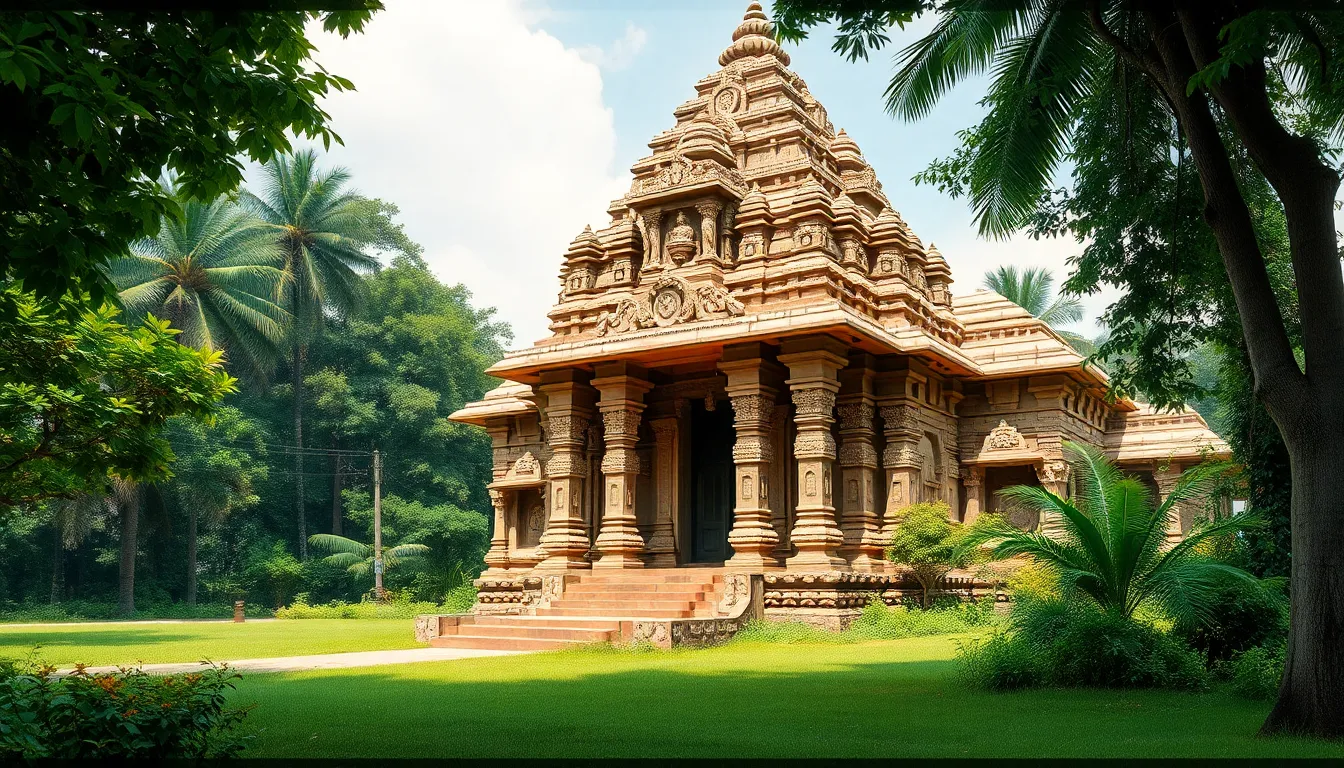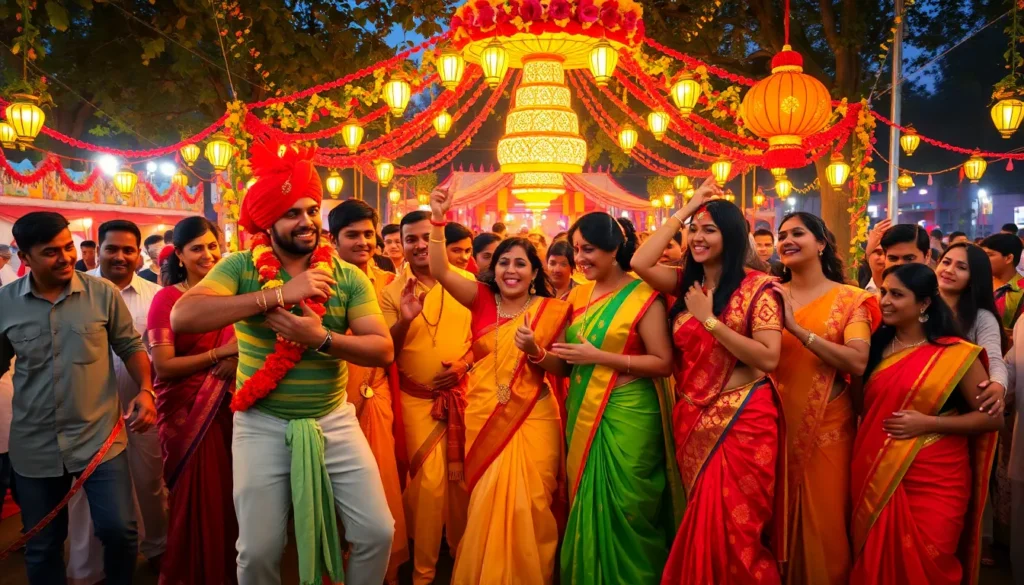Table of Contents
ToggleIn a world bursting with diverse cultures, the Hindu cultural society stands out like a vibrant peacock at a black-tie event. With its rich tapestry of traditions, festivals, and philosophies, it offers a unique lens through which one can explore the beauty of life. From mouthwatering cuisine that could make even a food critic weep to age-old rituals that bring communities together, this society is a feast for the senses.
Overview of Hindu Cultural Society
Hindu cultural society embodies a wide array of traditions, values, and practices shaping its identity. Celebrations highlight significant festivals such as Diwali, Holi, and Navratri, each marked by specific rituals, symbolizing deeper spiritual meanings. This rich tapestry of customs unites individuals and families, fostering community bonds.
Various philosophies play a crucial role in Hindu thought. Concepts like Dharma (duty), Karma (action), and Moksha (liberation) profoundly influence moral and ethical frameworks. Individuals often explore these ideas through ancient texts, including the Vedas and Upanishads, which provide guidance on living a meaningful life.
Cuisine also forms an integral part of this culture. Diverse regional dishes include biryani, dosa, and paneer, catering to various palates and dietary preferences. Meals serve as communal experiences, often shared during festivals and family gatherings, enhancing social interaction.
Rituals and ceremonies are central to Hindu life, marking milestones such as birth, marriage, and death. Each event adheres to specific customs that ensure respect for traditions while adapting to contemporary contexts. Temples and holy sites serve as venues for worship and community activities, reinforcing spiritual connections.
Arts and crafts abound within this culture. Traditional dance forms like Bharatanatyam and Kathak narrate stories rooted in mythology, while intricate designs in rangoli express creativity during festivities. Music, from classical ragas to contemporary Bollywood songs, also enriches this diverse artistic landscape.
The Hindu cultural society thrives on its multifaceted nature. Through festivals, philosophies, cuisine, rituals, and arts, it continues to evolve, adapting to modern influences while preserving age-old traditions.
Historical Background

Hindu cultural society boasts a rich historical tapestry woven through millennia. This society’s foundations originate from ancient Vedic traditions, shaping its unparalleled diversity and depth.
Origins and Evolution
Hinduism traces its origins to the Indus Valley Civilization, dating back to 2500 BCE. The Vedas, composed around 1500 BCE, are key texts that detail rituals and philosophies. Evolving over centuries, Hinduism integrated various regional practices and beliefs. From the philosophical schools to devotional movements, the evolution reflects an adaptation to sociopolitical changes. Historical texts document the ongoing synthesis, allowing Hindu culture to thrive through challenges like invasions and colonial rule. Adaptation to contemporary contexts reveals the dynamic essence of Hinduism, which continues to flourish today.
Key Historical Figures
Several historical figures profoundly influenced Hindu cultural society. Siddhartha Gautama, known as Buddha, introduced teachings that reshaped spiritual practices. Adi Shankaracharya, a philosopher from the 8th century, advocated Advaita Vedanta, promoting non-dualism. Ramanuja further developed devotional practices, emphasizing Bhakti as a path to divine connection. Kings like Ashoka played a vital role in spreading Buddhism and promoting non-violence. These figures contributed to a complex cultural landscape, bridging spirituality and governance. Their legacies resonate within Hindu society, offering diverse perspectives and practices that continue to enrich its heritage.
Core Beliefs and Values
Hindu cultural society is grounded in a rich tapestry of beliefs and values that guide daily life and spiritual practice.
Hindu Philosophy
Central tenets like Dharma emphasize duty and ethical living. Karma signifies the moral law of cause and effect, shaping individuals’ actions and their consequences. Moksha represents the ultimate goal of liberation from the cycle of rebirth. Texts such as the Bhagavad Gita and the Upanishads provide profound insights into these concepts, influencing adherents’ understanding of existence. Sacred philosophies encourage personal growth and self-realization. These philosophical frameworks form the bedrock of Hindu thought, guiding moral decision-making across generations.
Social Practices and Traditions
Social practices within Hindu culture embody values such as respect, community, and family. Rituals mark life events like births, marriages, and deaths, strengthening communal ties. Festivals such as Diwali and Holi bring together families and neighborhoods for joyous celebrations, fostering unity and cultural pride. Traditional attire often worn during events reflects regional diversity and heritage. Temples serve as communal hubs, providing spaces for worship and social engagement. Additionally, culinary traditions enhance gatherings, emphasizing the importance of shared meals in social bonding. Practices reaffirm Hindu society’s commitment to preserving customs while adapting to modern influences.
Festivals and Celebrations
Hindu festivals and celebrations showcase the community spirit and rich traditions central to Hindu cultural society. These events are vibrant showcases of ancestral values and cultural expressions.
Major Festivals
Diwali, Holi, and Navratri rank among the most significant festivals celebrated within Hindu communities. Diwali, the Festival of Lights, symbolizes the victory of light over darkness with vibrant decorations and fireworks. Holi, known as the Festival of Colors, brings people together for communal joy and playful celebrations with colored powders. Navratri honors the divine feminine through nine nights of music, dance, and fasting, emphasizing devotion. Each festival typically incorporates specific rituals, food offerings, and communal gatherings that strengthen ties among participants.
Cultural Significance
Festivals serve as important markers in the Hindu calendar and reflect deeper cultural narratives. They highlight themes such as renewal, joy, and victory, encouraging unity and collective celebration. Festivals provide an opportunity for families to come together, reinforcing bonds within the community. Many rituals performed during these celebrations link individuals to a historical legacy, fostering a sense of belonging. Additionally, these occasions allow for the transmission of cultural knowledge and values to younger generations, ensuring the continuity of cherished traditions.
Contributions to Society
Hindu cultural society contributes significantly to various fields, including art, literature, science, and technology. These contributions shape community identity and influence modern advancements.
Art and Literature
Art and literature within Hindu culture showcase rich traditions and narratives. Classical dance forms like Bharatanatyam and Kathak express spiritual stories, blending storytelling with intricate movements. Traditional music embodies deep spiritual meanings, often performed during rituals and celebrations. Literature flourishes through epic texts like the Mahabharata and Ramayana, which impart moral lessons and philosophies. Poetry also thrives, with contributions from renowned poets such as Kalidasa and Tulsidas. Their works remain central to cultural education, providing insights into human experience and ethical dilemmas.
Science and Technology
Hindu culture has historical roots in scientific and technological advancements. Ancient texts like the Vedas contain knowledge in mathematics, astronomy, and medicine. Concepts such as zero and the decimal system originated in this cultural context, transforming mathematics globally. Ayurveda, the traditional system of medicine, emphasizes holistic healing and preventive care, often practiced today. Innovations in architecture are evident in temple designs, reflecting advanced engineering principles. As a result, these contributions demonstrate the enduring legacy of Hindu society’s intellect and creativity in shaping the world.
Modern Influences and Global Reach
Modern Hindu culture exhibits resilience and adaptability, reflecting contemporary values while honoring traditional practices.
The Hindu Cultural Society Today
The Hindu cultural society thrives as a dynamic entity, encompassing diverse expressions and adaptations. Festivals, art forms, and philosophies continue to evolve, integrating global influences while maintaining core beliefs. Shared rituals strengthen connections among communities, even as lifestyles modernize. Culinary traditions showcase regional variations and innovative twists, inviting appreciation from broader audiences.
Global Hindu Communities
Global Hindu communities flourish across continents, creating vibrant spaces for cultural exchange. Temples serve as cultural centers, promoting education, spiritual growth, and community engagement. Numerous organizations foster connections among diaspora, celebrating heritage through events and festivals. Significant populations in countries like the United States, Canada, and the UK engage actively, preserving customs and sharing them with local communities. Social initiatives reflect Hindu values, addressing issues like education and healthcare, thus enhancing their global presence.
Hindu cultural society stands as a testament to the richness and diversity of its traditions and values. With its vibrant festivals and deep-rooted philosophies, it continues to foster community connections and personal growth. The dynamic nature of Hinduism allows it to adapt while preserving essential customs that have shaped its identity for centuries.
As it flourishes globally, Hindu culture not only enriches the lives of its practitioners but also invites others to engage in its colorful tapestry. The ongoing contributions to art, science, and social initiatives highlight the enduring legacy of this ancient civilization. Through its resilience and adaptability, Hindu cultural society remains a source of inspiration and unity for generations to come.







